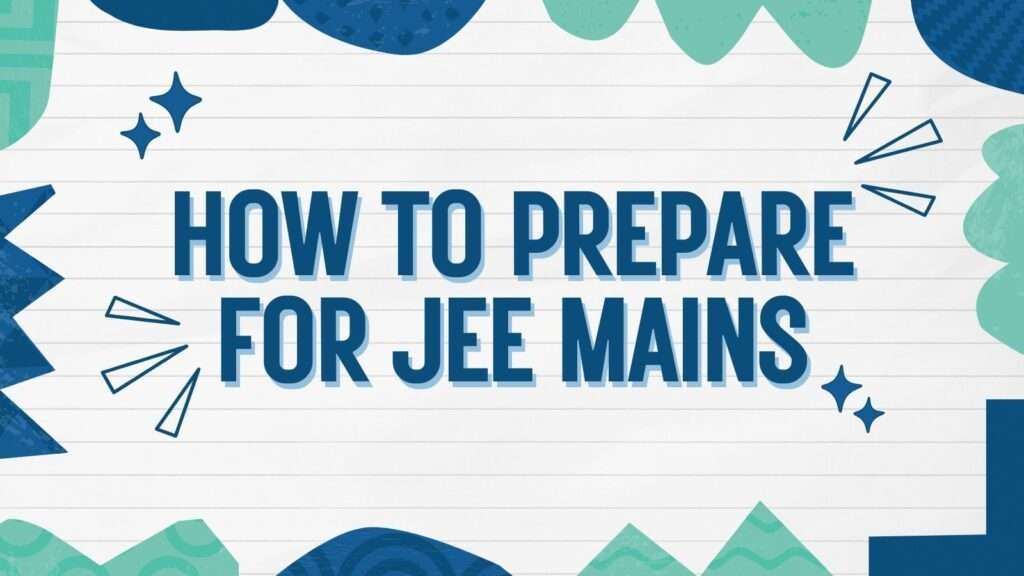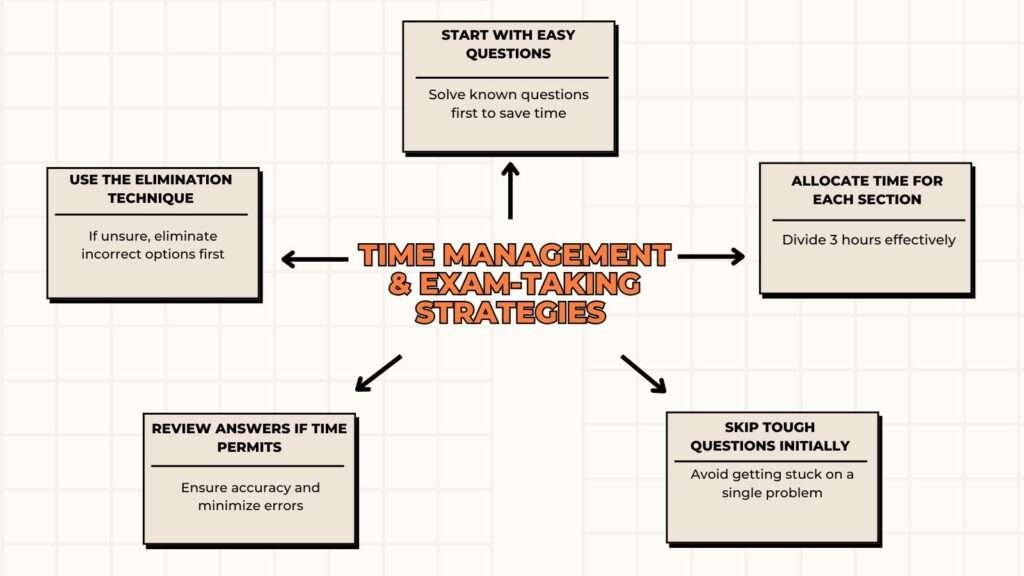
Contents
JEE Mains is one of the most competitive entrance exams in India conducted by NTA (National Testing Agency), serving as the gateway to prestigious engineering institutes like NITs, IIITs, and other top colleges. Every year lakhs of students appear for this exam, making it crucial to have a solid preparation strategy for aspirants.
For aspirants thinking about how to prepare for JEE Mains they must understand that to succeed in JEE Mains it requires a well-structured approach, strong conceptual clarity, rigorous practice, and effective time management. This guide will help candidates navigate through the best strategies to prepare efficiently and maximize their chances of securing a high rank.
Candidates who are planning about how to prepare for JEE Mains before getting started with preparation, understanding the exam pattern is crucial:

A structured study plan ensures effective coverage of the syllabus and systematic revision. Here’s how you can plan efficiently for the exam:
i. Set a Daily Schedule: Allocate fixed hours everyday for studying, revision, and mock tests.
ii. Prioritize Topics: Focus on high-weightage topics in the beginning.
iii. Use a Balanced Approach: Cover all three subjects daily to maintain consistency.
iv. Set Weekly & Monthly Goals: Helps track progress and adjust study methods accordingly.
v. Include Revision Time: Regular revision of concepts help in retaining information.
Each subject requires a distinct approach for effective preparation.
Physics
i. Focus on conceptual clarity rather than rote learning.
ii. Solve numerical problems daily to strengthen problem-solving skills.
iii. Understand derivations and their applications.
iv. Important topics: Mechanics, Electricity & Magnetism, Optics, Modern Physics.
v. Recommended Books:
NCERT Physics
H.C. Verma (Concepts of Physics)
D.C. Pandey (Arihant Series)
Chemistry
i. Divide your preparation into Physical, Organic, and Inorganic Chemistry.
ii. Physical Chemistry: Solve numerical problems and focus on formulas.
iii. Organic Chemistry: Understand reaction mechanisms rather than memorizing.
iv. Inorganic Chemistry: NCERT is key; revise periodically.
v. Important topics: Thermodynamics, Coordination Compounds, Biomolecules, Polymers.
vi. Recommended Books:
NCERT Chemistry
O.P. Tandon (Physical & Inorganic Chemistry)
Morrison & Boyd (Organic Chemistry)
Mathematics
i. Strengthen basics and formulas.
ii. Practice problem-solving speed and accuracy.
iii. Important topics: Algebra, Calculus, Coordinate Geometry, Trigonometry.
iv. Recommended Books:
NCERT Mathematics
R.D. Sharma
Cengage Mathematics Series
How many attempts for JEE Mains
The students must plan on studying from the NCERT textbooks, reference books, question papers, etc. NCERT can be used to develop a solid base and then aspirants must other books for reference.
NCERT Textbook: NCERT books are the foundation for aspirants thinking about how to prepare for JEE Mains. Many direct questions are asked from NCERT, especially in Chemistry. They help in building strong conceptual clarity, making it easier to grasp advanced topics.
Reference Books: In order to perform well in JEE Mains 2026 students must know the best reference books. Books which offer clear explanations , proper examples and good number of numerical problems.
Past Question Papers: Solving previous years’ question papers will improve students time management skills which in turn boosts their confidence level.
Mock Tests: Taking regular mock tests helps students in evaluating themselves and take corrective actions to improve their overall preparation. It also helps aspirants develop familiarity with JEE Exam question pattern and degree of difficulty.
Choosing the right books is essential for performing well in competitive exams like JEE Mains. Below is a list of recommended resources:
Physics Books
Concepts of Physics by H.C. Verma
Understanding Physics by D.C. Pandey
Chemistry Books
Physical Chemistry by O.P. Tandon
Organic Chemistry by Morrison and Boyd
Mathematics Books
Objective Mathematics by R.D. Sharma
Higher Algebra by Hall & Knight
Practicing previous year question papers and taking regular mock tests is one of the most effective ways for how to prepare for JEE Mains and increase the chances of securing good ranks.
i. Understand Exam Pattern: Increases familiarity with question types and difficulty level.
ii. Improve Time Management: Taking regular mock tests and solving previous year questions helps improve time management skills of aspiring candidates.
iii. Analyze Strengths & Weaknesses: It helps to identify and work on weak areas.
iv. Enhance Accuracy & Speed: Minimizes negative marking by improving precision.
v. Boost Confidence: Simulating real exam conditions leads better performance during exam.
Managing time efficiently during JEE Mains is crucial for maximizing your score.

How to prepare for JEE Advanced
While self-study is important, coaching institutes provide additional support to aspiring students thinking about how to prepare for JEE Mains.
Benefits of Coaching Institutes:
i. Structured study plans.
ii. Expert guidance and doubt resolution.
iii. Regular mock tests and analysis.
Many students make avoidable mistakes during their JEE preparation. Here’s what they should be aware of:
i. Not revising regularly leads to forgetting concepts.
ii. Instead of relying on too many books stick to limited and reliable resources.
iii. Use NCERT books properly and revise them thoroughly instead of ignoring them.
iv. Not taking Mock Tests seriously, they simulate real exam environment.
v. Neglecting weaker subjects, instead balance the preparation across all the subjects.
i. Focus on revision rather than learning new topics in the last 30 days.
ii. Summary notes help quick reference for formulas and key concepts.
iii. Prioritize frequently asked topics, revise high weightage topics.
iv. Solve mock tests as it simulates real exam conditions.
Good health plays a vital role in efficient preparation.
i. Balanced Diet: Eat nutritious food to stay energetic.
ii. Adequate Sleep: Ensure 6-8 hours of sleep daily.
iii. Exercise & Meditation: Helps in stress management and better concentration.
iv. Avoid Social Media Distractions: Limit phone usage to stay focused.
v. Take Breaks: Short breaks after every study session improve productivity.
Preparing for JEE Mains from the comfort of home has become increasingly viable with the wealth of resources available online. A structured approach combined with discipline can help you achieve excellent results without the need to join any coaching institute.
Creating an Effective Study Environment
Your study environment significantly impacts your preparation. Here’s how to optimize it:
Leveraging Online Resources
The internet offers a treasure trove of JEE preparation materials:
i. Video Lectures: Platforms like Khan Academy, Unacademy, and YouTube channels of renowned educators offer comprehensive lessons on JEE topics
ii. Mock Tests: Websites like NTA’s official portal, Embibe, and Gradeup provide realistic mock tests with performance analysis
iii. Discussion Forums: Join platforms like Quora, Reddit’s r/JEE, or Telegram groups to connect with peers and mentors
iv. E-Books and PDF Resources: Access digital textbooks and study materials from trusted sources
v. Online Doubt Clearing: Use platforms that offer personalized doubt-solving sessions with experts
Developing a Robust Study Schedule
Structure is critical when preparing at home:
Self-Assessment Techniques
Regular self-evaluation helps identify areas for improvement:
Succeeding in JEE Mains on your first try requires strategic planning and execution. Here’s a comprehensive approach to maximize your chances of success.
1. Understanding the Exam Pattern Thoroughly
Before diving into preparation, familiarize yourself with the exam structure:
2. Crafting a Subject-Wise Strategy
Each subject requires a unique approach:
Physics
Chemistry
Mathematics
3. Effective Revision Techniques
Systematic revision is crucial for retention:
i. Spaced Repetition: Review material at increasing intervals
ii. Active Recall: Test yourself on what you’ve learned rather than passive re-reading
iii. Condensed Notes: Create concise notes for last-minute revision
iv. Question Bank Practice: Solve previous years’ papers and mock tests repeatedly
i. Students should have a thorough understanding of the JEE Main syllabus 2026 during their preparation. JEE Main syllabus is prepared based on NCERT textbooks.
ii. Students must plan their study time based on the weightage of various topics in the JEE Main question paper. More time should be given to challenging topics and less time on topics that require revision.
iii. Preparing notes of chapters can help students help during the last minute revision.
iv. Revision should be strategically made part of the preparation journey by the students to bring strong hold over the topics
v. Students must form a habit of clearing doubts immediately which is crucial for understanding the upcoming topics
vi. Practice time management is very important to make the most out of the three hours during the exam without anxiety.
vii. Regular mock tests should be part of the preparation as this helps in understanding the JEE Mains Question paper pattern and at the same time improves their accuracy and speed which are crucial for JEE success.
viii. Students should take care of their health and as much as possible avoid distractions and stay focused
Starting JEE preparation early in Class 11 provides a significant advantage, allowing you to build a strong foundation and avoid last-minute cramming.
First Semester Approach (Months 1-6)
The initial phase should focus on building fundamentals:
Second Semester Approach (Months 7-12)
Once basics are covered, increase the intensity:
Summer Break Utilization
The vacation between Class 11 and 12 is crucial:
i. Comprehensive Revision: Thoroughly revise Class 11 concepts
ii. Advanced Problem Solving: Tackle challenging questions from reputable sources
iii. Mock Tests: Take full-length tests based on Class 11 syllabus
iv. Preview Class 12 Topics: Get a head start on upcoming concepts
v. Build a Support Network: Connect with peers and mentors who can provide guidance
While a month is a short time for comprehensive preparation, strategic studying can help you maximize your score.
Emergency Preparation Plan
With limited time, you need a focused approach:
Last-Minute Preparation Tips
As the exam approaches:
JEE Mains is a challenging exam, but with smart planning, consistent efforts, and the right strategy, success is achievable. Stay disciplined, revise regularly, practice mock tests, and maintain confidence. Remember, perseverance and determination will ultimately lead you to your dream engineering college.
The JEE Main exam for 2025 has 90 multiple-choice questions (MCQs) and numerical value questions (NVQs).
The minimum marks required to clear JEE Mains depends on the category of the candidate and varies from year to year. The National Testing Agency (NTA) will release the passing marks for JEE Mains.
General : 92 – 100
General PwD : 0.0017 – 92
EWS: 83 – 92
OBC-NCL: 78 – 92
SC: 61 – 92
ST: 47 – 9
Candidates need to score at least 75% in 12th board exam in case they are from General category and if they are from SC/ST category, they need to score atleast 65%. They can also qualify if they are from the top 20 percentile of class 12 exam.